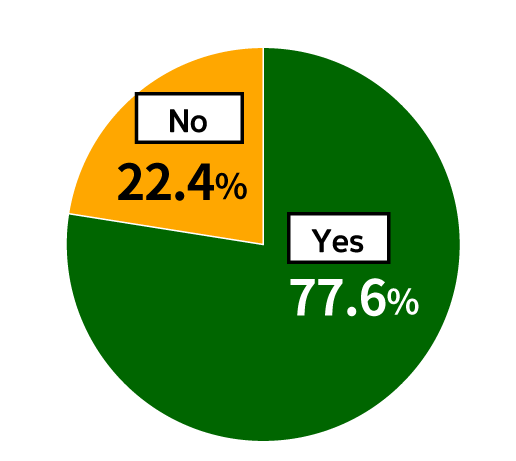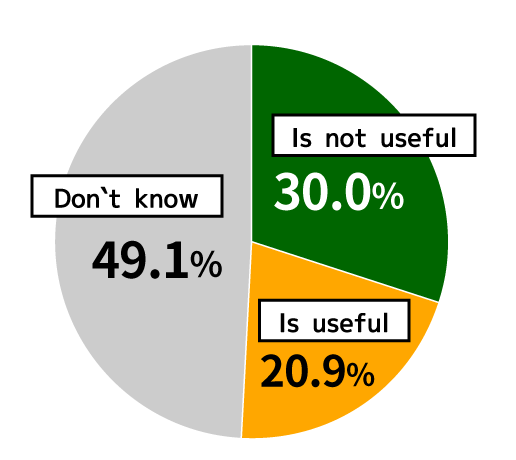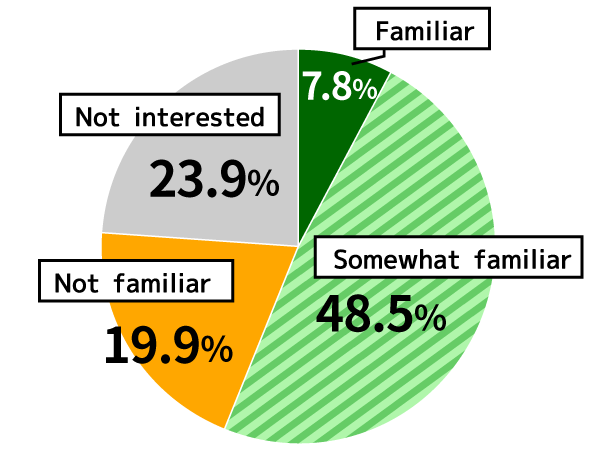Awareness Survey of 18-Year-OldsResults of 11th and 12th installments announced
The 11th installment of the Awareness Survey of 18-Year-Olds, launched by The Nippon Foundation in October 2018, was carried out in late February, nearly eight years after the Great Eastern Japan Earthquake struck northeastern Japan in March 2011. The theme was “Disaster Response,” and the results, announced on March 5, showed that close to 80% of respondents said that the many natural disasters in recent years make them feel uneasy, and of those, roughly 70% said that this was Japan is a country that is prone to natural disasters. More than 80% of respondents felt that the national government’s disaster response measures are “insufficient,” and indicated that those measures would not be fully able to address a large number of greater-than-anticipated disasters.
The results of the 12th installment, on the theme of “Reform of the National Diet,” were announced on March 28. The survey showed that 30% of respondents do not feel that the Diet (Japan’s national bicameral legislature) is not useful for improving people’s daily lives, while roughly 20% feel that it is useful. Slightly more than half of respondents were at least somewhat familiar with the Diet’s deliberations, but roughly the same percentage did not feel that the Diet is a place of meaningful policy deliberation.
- *Notes | In the information below, differences between total amounts and simple sums are due to rounding.
Survey 11. Disaster Response (Results announced on March 5, 2019)
Finding: 77.6% of respondents feel uneasy about a major disaster.
In recent years Japan has experienced many earthquakes, floods, and other natural disasters. Does this make you feel uneasy? (n=800)
- Yes (77.6%)
- No (22.4%)

Among those who feel uneasy, the top reasons were (multiple answers allowed; n = 621)
- Because Japan has many disasters – 68.9%
- Greater than expected disasters are becoming more commonplace – 38.5%
- I live in an area where a major disaster is forecast – 30.0%
- I have experienced a major disaster – 19.5%
Among those who do not feel uneasy, the top reasons were (multiple answers allowed; n = 179)
- I don’t imagine it as something concerning me – 36.3%
- I have never experienced a major disaster – 32.4%
- I live in a safe location – 26.3%
- I live in a location that has never had a major disaster – 19.6%
Finding: Roughly 80% of respondents feel that the government’s disaster prevention and response measures are insufficient.
Do you think the government’s measures for disaster prevention and response are sufficient? (n=800)
- No – 80.9%
- Yes – 19.1%
Among those who feel the government’s measures are insufficient, the top reasons were (multiple answers allowed; n = 647)
- The government cannot keep up with the large number of greater-than-anticipated disasters that are occurring – 53.3%
- Municipal measures are insufficient – 43.0%
- Aging roads, bridges, and other infrastructure are not being sufficiently maintained – 42.7%
- Disaster prevention and response education is insufficient – 32.5%
- I don’t know where my evacuation area is – 24.0%
Among those who feel the government’s measures are sufficient, the top reasons were (multiple answers allowed; n = 153)
- I somehow feel they are – 39.2%
- As a country with many disasters, Japan has sufficient experience – 23.5%
- Disaster prevention and response education is sufficient – 22.9%
- Measures are in place where I live – 19.0%
- I don’t feel particularly uneasy – 17.0%
Survey 12. Reform of the National Diet (Results announced on March 28, 2019)
Finding: 30.0% of respondents feel that the Diet is not useful for improving people’s daily lives, while 20.9% feel it is. (n=800)
- Is useful – 20.9%
- Is not useful – 30.0%
- Don’t know – 49.1%

Finding: Slightly more than half of respondents are at least somewhat familiar with the Diet’s deliberations. (n=800)
- Familiar – 7.8%
- Somewhat familiar – 48.5%
- Not familiar – 19.9%
- Not interested – 23.9%

Finding: More than half of respondents do not believe that the Diet is a place for meaningful policy deliberation.
In response to the question “Do you believe the Diet is a place for meaningful policy deliberation?” (n=800)
- Yes – 5.0%
- No – 54.8%
- Don’t know – 40.3%
Top reasons given for not believing the Diet is a place for meaningful policy deliberation (multiple answers allowed; n=438)
- Diet members do not listen to what each other is saying – 57.3%
- To much time is spent on things other than policy deliberation – 50.2%
- The same questions are asked repeatedly – 44.3%
- Diet members are detached from people’s interests – 33.8%
- It is too much like a performance – 28.3%
Contact
Communications Department
The Nippon Foundation
- E-mail:cc@ps.nippon-foundation.or.jp



